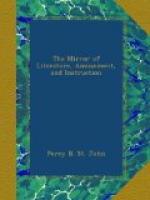(Library of Entertaining Knowledge, Part 18.)
We have little inclination to quote more than a few passages from the General View of Paris in this Number; the topographical portion of which, (as far as a four months residence there will serve our judgment) is eminently characteristic.
Ancient City.
The Archbishop of Narbonne, writing in the reign of Francis I., (about 1520,) calls Paris even then a world rather than a city[3]; yet at that period its population was probably not much more than the fifth part of what it now is; nor did the quantity of ground it covered bear even the same proportion to the immense space over which it has now extended. But in both convenience and elegance, Paris has made still more extraordinary advances since the time of Francis than even in population and extent. It was then, compared to what it now is, but a gloomy and incommodious fortress, without even the security which encompassing fortifications might be supposed to yield. Lighted only by candles placed here and there by the inhabitants themselves in their windows, it was so infested by thieves and assassins that hardly any person ventured out after dark, and the approach of night was the source of constant terror even to those who remained in their houses. The streets thus imperfectly lighted, were worse paved; and most of them were as dirty and narrow as those still to be seen in the more ancient part of the city. The supply of water was so inadequate that the severest miseries were sometimes suffered from the absolute want of that necessary of life, and the greatest inconveniences at all times from its scarcity. Finally, the public edifices were without splendour, and even the best of the private houses unprovided with many of what are now accounted the most indispensable accommodations. Instead of all this, we behold Paris now one of the very central seats of civilization; and although still deficient in many of the accommodations which supply to the necessities of the many instead of the luxuries of the few, in possession of the greater portion of the most important provisions which ingenuity has found out, whether for the comfort or the embellishment of existence. What a contrast between the French capital of 1831, and that Lutetia of the ancient Parisii, which Caesar found nearly nineteen hundred years ago occupying the little island, around which has since extended itself so wide a circle of wealth, industry, intelligence, and the works which these create!
[3] Felibien, Histoire de Paris, tome i.
Bridges.
Paris, stands, like London, on both banks of a river, and is thus cut into two great divisions, one to the north, and the other to the south, of the water. The Seine, however, is not nearly so broad as the Thames; and the northern and southern halves of Paris are not, therefore, by any means so much separated from each other, either locally, politically, or socially, as are the corresponding portions of the English metropolis. They form, in all respects one city.




